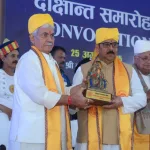I came across a humorous quote that mentioned, “Historically, individuals who sacrificed sleep, time with family, meals, joy, and happiness were referred to as saints.” Nowadays, we refer to them as PhD students.” Similar to many jokes, it may hold a grain of truth. Numerous individuals pursuing a PhD would concur, as it requires genuine commitment and frequently entails personal sacrifice.
Nonetheless, in spite of the challenges, undertaking a PhD can be an immensely rewarding and even delightful journey. That is something I gradually learned. Through this, I aim to convey the lessons I learned from the experience. Prior to joining the program, I was interested in science and had a deep ambition to become a professor. I thought this programme would be the perfect starting point for my research journey.
However, I did not recognize how intense and demanding the academic setting would be, which I now understand is typical in top research institutions. I quickly discovered that I was struggling. At the conclusion of my second year, I sensed fatigue and uncertainty. The pressure was intense, and I began reflecting on the job prospects I had overlooked to pursue this direction.
Doing a PhD can sound exciting on paper,diving deep into a topic you are passionate about, pushing the boundaries of knowledge, and maybe even making a big discovery. But let me be honest it is also incredibly tough. Behind every thesis draft and semester presentations are real emotional struggles that often go unspoken.So let me talk about what it really feels like to do a PhD and why that is okay.
Ever feel like you don’t belong or are not smart enough to be doing a PhD. You are not alone. Many students battle with impostor syndrome, especially in environments where everyone seems to be doing ground-breakingwork.Research can be lonely. Whether you are in the lab at midnight or staring at your screen at home, it is easy to feel cut off from the rest of the world especially if your work is highly specialized.Juggling experiments, reading, writing, It is a lot.
Over time, the constant pressure can lead to exhaustion and a lack of motivation also known as burnout. Success is measured in vague milestones like papers, awards, or maybe just feeling like things are moving. That can be mentally draining.Some supervisors are amazing mentors. Others not so much. Miscommunication or mismatched expectations can make the experience harder than it needs to be. Let us not ignore the financial side. Stipends don’t always go far, especially if you have to pay for expenses.
Financial stress can weigh heavily over time.And doing the PhD without a stipend.One can imagine how stressful it may be for the student.Not everyone stays in academia. And even if you want to, academic jobs are competitive. The uncertainty about what comes after the PhD can lead to anxiety and fear. Sharing what you are going through with peers or joining support groups can help you feel less alone.
Big goals are intimidating. Small, daily tasks are manageable and give a sense of progress.Most universities have free mental health services. Use them. You are not expected to carry everything alone.Yes, you can take weekends off. You need time to recharge,your brain will thank you.
Keep life outside the PhD alive: Hobbies, friends, and non-academic interests keep you grounded. PhD life is challenging, and it is okay to admit that. The stress, emotions, and ups and downs are part of the journey, not signs that you are doing it wrong.
What matters most is recognizing when you need support, setting boundaries, and remembering that you are more than just your research.If you are struggling, reach out. You are definitely not the only one.
(Author is Doctorate (SKUAST K). Feedback: [email protected])








